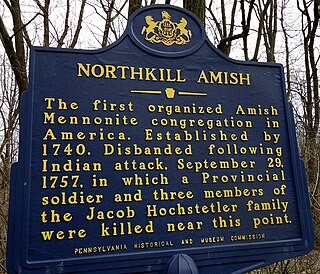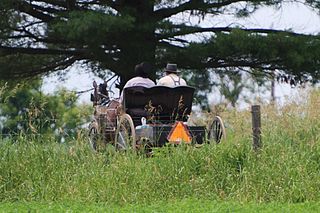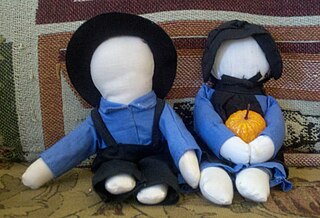
Pennsylvania Dutch, referred to as Pennsylvania German in scholarly literature, is a variety of West Central German spoken by the Old Order Amish, Old Order Mennonites and other descendants of German immigrants in the United States and Canada, closely related to the Palatine dialects. There are possibly more than 300,000 native speakers in the United States and Canada. In Pennsylvania, 29.9% of the population currently claim German ancestry.

Plain people are Christian groups characterized by separation from the world and by simple living, including plain dressing in modest clothing. Many Plain people have an Anabaptist background. These denominations are largely of German, Swiss German, Dutch or other European ancestry. Conservative Friends are traditional Quakers who are also considered plain people; they come from a variety of different ethnic backgrounds.

The Nebraska Amish, also called Old Schoolers, are a relatively small affiliation of the Amish. They are the most conservative subgroup of Amish, indicated not only by their use of technology but also by their particular style of dress. They emerged in 1881 as a conservative split from the Byler Amish who themselves emerged as the first conservative splinter group from the Amish mainstream in 1849.
Yoder is a surname that originated from the Canton of Bern in Switzerland. The name dates back to at least 1260, and is a shortened version of the name Theodorus.
Rumspringa, also spelled Rumschpringe or Rumshpringa, is a rite of passage during adolescence, translated from originally Swabian German to English as "jumping or hopping around", used in some Amish communities. The Amish, a subsect of the Anabaptist Christian movement, intentionally segregate themselves from other communities as a part of their faith. For Amish youth, the Rumspringa normally begins around the ages of 14–16 and ends when a youth chooses either to be baptized in the Amish church or to leave the community. For Wenger Mennonites, Rumspringa occurs between ages of 17 and 21.

The Northkill Amish Settlement was established in 1740 in Berks County, Pennsylvania. As the first identifiable Amish community in the new world, it was the foundation of Amish settlement in the Americas. By the 1780s it had become the largest Amish settlement, but declined as families moved elsewhere.
John A. Hostetler was an American author, educator, and scholar of Amish and Hutterite societies. Some of his works are still in print.
Loewen is a spelling variant of the word Löwen which means "lions" in German. This spelling is uncommon in Germany, Austria, and Switzerland and a surname with this spelling is usually used by Mennonites or by Americans who Americanized their Löwen to Loewen. Notable people with the name include:
Hostetler is a surname of German origin. The name refers to:

The Amish are a group of traditionalist Christian church fellowships with Swiss German and Alsatian Anabaptist origins. They are closely related to Mennonite churches. The Amish are known for simple living, plain dress, Christian pacifism, and slowness to adopt many conveniences of modern technology, with a view neither to interrupt family time, nor replace face-to-face conversations whenever possible, and a view to maintain self-sufficiency. The Amish value rural life, manual labor, humility, and Gelassenheit, all under the auspices of living what they interpret to be God's word.
The Swartzentruber Amish are the best-known and one of the largest and most conservative subgroups of Old Order Amish. Swartzentruber Amish are considered a subgroup of the Old Order Amish, although they do not fellowship or intermarry with more liberal Old Order Amish. They speak Pennsylvania German as their mother tongue as well as English.
Troyer is a last name which is widespread among the Amish, Brethren and the Mennonites. It is the Pennsylvania German form of the German last name "Dreier", "Dreyer" or "Treyer". Hans Treyer, an early Anabaptist leader, died as a martyr of his faith in Bern in 1529.

Amish believe large families are a blessing from God. Amish rules allow marrying only between members of the Amish Church. The elderly do not go to a retirement facility; they remain at home. As time has passed, the Amish have felt pressures from the modern world; their traditional rural way of life is becoming more different from the modern society. Isolated groups of Amish populations may have genetic disorders or other problems of closed communities. Amish make decisions about health, education, relationships based on their Biblical interpretation. Amish life has influenced some things in popular culture.
Subgroups of Amish developed over the years, as Amish churches have divided many times over doctrinal disputes. The 'Old Order' Amish, a conservative faction that withdrew from fellowship with the wider body of Amish in the 1860s, are those that have most emphasized traditional practices and beliefs. There are many different subgroups of Amish with most belonging, in ascending order of conservatism, to the Beachy Amish, New Order, Old Order, or Swartzentruber Amish groups.

Amish dolls are a type of rag doll and a popular form of American folk art, which originated as children's toys among the Old Order Amish people. While some Amish dolls have faces, the best-known ones do not, to emphasize the fact that all are alike in the eyes of God.
Stoltzfus is a surname of German origin. It is common among Mennonites and Amish. All American Stoltzfuses are descended from Nicholas Stoltzfus (1719–1774), an Amish man who migrated from Germany to America in 1766.
Kiser is a variation spelling of the Germanic Kaiser surname, and is pronounced in the same manner as Kaiser. This spelling originated before Standard German was codified, in territory that today falls within the mountainous Black Forest area of Germany and neighboring areas of Switzerland. The Kiser Family spelling is also common among current descendants living in the forested mountainous Appalachian mountains of North America. This surname may refer to:
The Old Order Movement is a religious movement to preserve the old ways of Anabaptist religion and lifestyle. Historically, it emerged in the second half of the 19th century among the Amish, Mennonites of South German and Swiss ancestry as well as the Schwarzenau Brethren in the United States and Canada. The movement led to several Old Order divisions from mainstream Anabaptist groups between 1845 and 1901. All Old Order groups that emerged after 1901 divided from established Old Order groups or were formed by people coming from different Old Order groups. The highly conservative Old Colony Mennonites and the Hutterites were not directly connected to this movement.
Hostettler is a surname. Notable people with the surname include:






